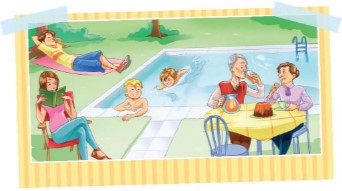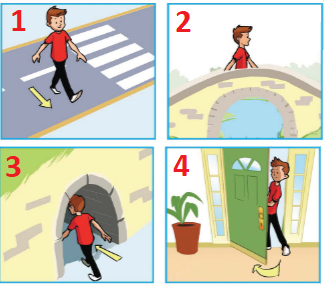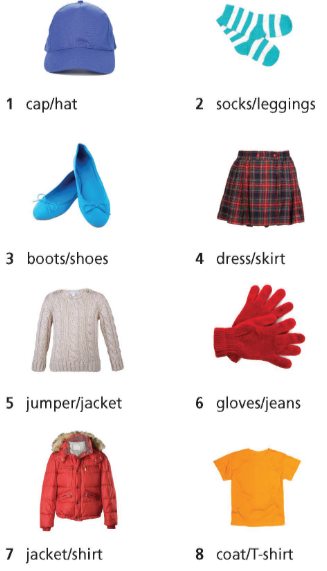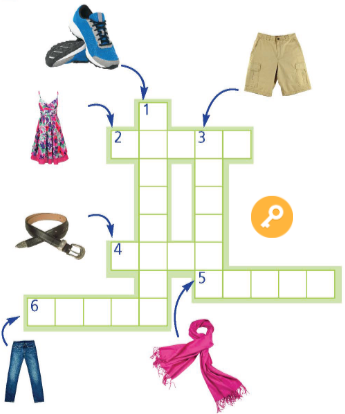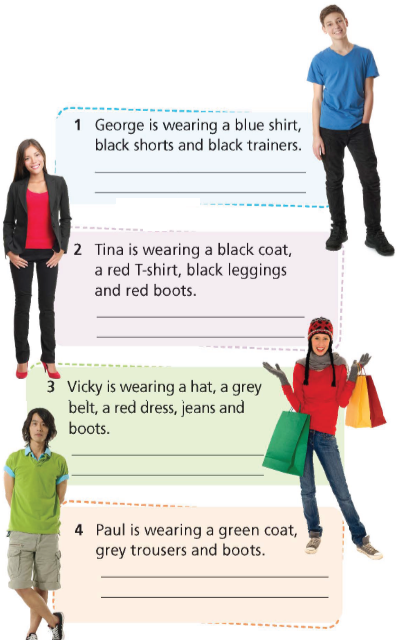Giải SGK, SBT Unit 4. Holidays! Right on!
Giải SGK, SBT Unit 4. Holidays! Right on!
Reading
Exercise 1. Where is Cheryl? Katy? Can you guess from the pictures? Look at the messages quickly and say.
(Cheryl đang ở đâu? Katy nữa? Em có thể đoán từ các bức tranh không? Nhìn các tin nhắn thật nhanh và trả lời.)
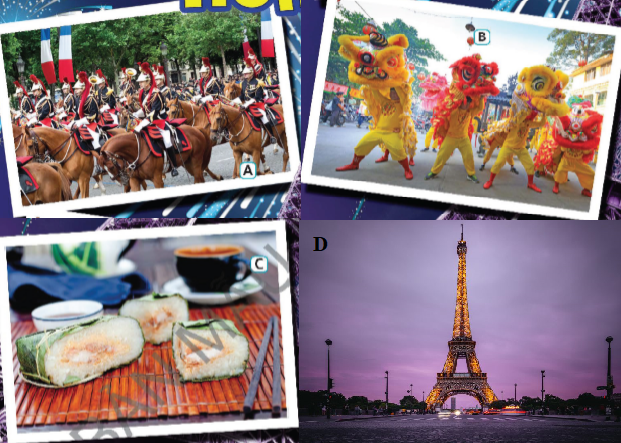
|
Cheryl Hi Tony, We're having a great time in Paris, France. Today is 14th July. It's Bastille Day and people are celebrating it with parties and parades. They hang flags everywhere and dress up. It's warm and sunny here Oh, guess what? There are fireworks at midnight I can't wait to watch them. See you soon. Cheryl |
|
Katy Hi Susan, I'm writing to you from Hanoi. People here are celebrating Tết the Lunar New Year. Locals decorate their houses with colourful flowers and family members eat together and visit relatives. Children usually get money in a red envelope as a present from their parents or elder relatives. Right now we are eating bánh chưng. This is a steamed square cake. It is delicious. We're going to see a lion dance performance later. See you next week. Katy |
Exercise 2. Read the texts and write P (for Paris) or H (for Hanoi).
(Đọc các văn bản và viết P (thay cho Paris) và H (thay cho Hà Nội).)
Where you can see…
|
1. a parade? |
|
|
2. lion street performances? |
|
|
3. parties? |
|
|
4. fireworks at midnight? |
|
|
5. colourful flowers? |
|
Present Continuous (affirmative / negative)
(Thì hiện tại tiếp diễn – khẳng định / phủ định)
|
|
affirmative |
negative |
|
I |
am sleeping (‘m sleeping) |
am not sleeping (‘m not sleeping) |
|
You |
are sleeping (‘re sleeping) |
are not sleeping (aren’t sleeping) |
|
He/ She/ It |
is sleeping (‘s sleeping) |
is not sleeping (isn’t sleeping) |
|
We/ You/ They |
are sleeping (‘re sleeping) |
are not sleeping (aren’t sleeping) |
Look! Barry’s playing basketball. He isn’t playing football.
(Nhìn kìa! Barry đang chơi bóng rổ. Bạn ấy không chơi bóng đá.)
Exercise 1. Read the table. Write the –ing form. Then read them aloud.
(Đọc bảng. Viết dạng –ing. Sau đó đọc to các từ này lên.)
|
1. drink - ___________ 2. marvel - ___________ 3. take - ___________ 4. run - ___________ |
5. study - ___________ 6. put - ___________ 7. lie - ___________ 8. come - ___________ |
Present Continuous (interrogative & short answers)
(Thì hiện tại tiếp diễn – câu nghi vấn & trả lời ngắn)
|
Interrogative |
Short answers |
|
Am I sleeping? |
Yes, I am. No, I’m not. |
|
Are you sleeping? |
Yes, you are. No, you aren’t. |
|
Is he/ she/ it sleeping? |
Yes, he/ she/ it is. No, he/ she/ it isn’t. |
|
Are we/ you/ they sleeping? |
Yes, we/ you/ they are. No, we/ you/ they aren’t. |
- Are you playing an online game, Nat?
(Em đang chơi trò chơi trực tuyết à, Nat?)
- No, Mr Drake. I’m sending a message to Maria.
(Không ạ thưa thầy Drake. Em đang gửi tin nhắn cho Maria ạ.)
Exercise 4. Read the table. Look at the picture. Write questions, then answer them.
(Đọc bảng. Nhìn vào bức tranh. Viết các câu hỏi và câu trả lời cho những câu hỏi đó.)
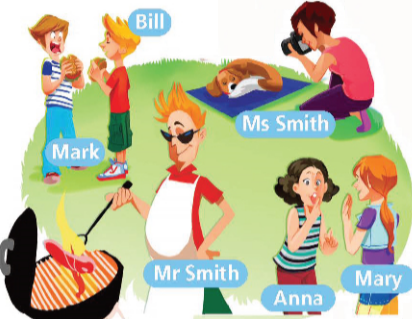
1. Mr Smith/eat? (x) / have a barbecue (✓)
Is Mr Smith eating? No, he isn’t. He's having a barbecue.
2. Mark and Bill/ take a bike ride? (x) / eat sandwiches (✓)
___________________________________
3. Anna and Mary/drink tea? (x) /talk (✓)
___________________________________
4. Ms Smith/ make a snowman? (x) / take photos (✓)
___________________________________
5. the dog/play?(x) /sleep (✓)
___________________________________
Clothes/ Accessories/ Footwear
(Quần áo/ Phụ kiện/ Giày dép)
1. Match the words (1-18) to the pictures (A-R). Listen and check, then repeat. Which are accessories?
(Nối các từ 1 – 18 với các bức tranh A – R. Nghe và kiểm tra, sau đó lặp lại. Cái nào là phụ kiện?)
|
1. belt |
7. boots |
13. shorts |
|
2. cap |
8. shoes |
14. skirt |
|
3. gloves |
9. socks |
15. dress |
|
4. scarf |
10. T – shirt |
16. jeans |
|
5. leggings |
11. shirt |
17. jackets |
|
6. trainers |
12. jumper |
18. hat |
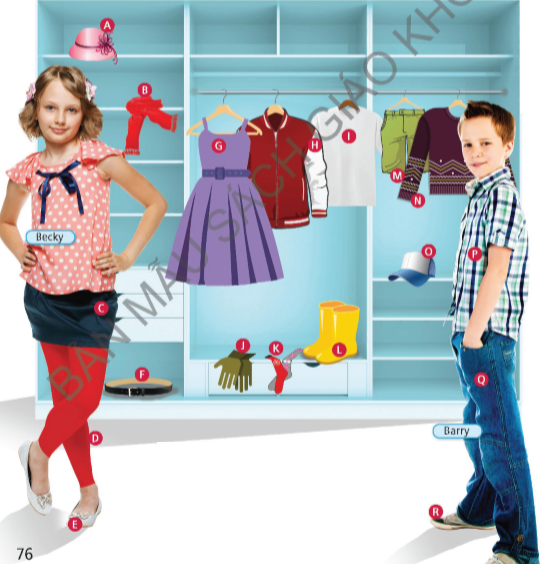
Making suggestions (Đưa ra lời đề nghị)
1. Complete the dialogue. Use the sentences (A-E).
(Hoàn thành hội thoại. Sử dụng câu A – E.)
|
A. What's wrong now? B. Here, take mine. C. Why don't you put on your gloves? D. Let's ask Nat for his. E. No problem. |
Helen: Wow! I love it here in Moscow! The sights are amazing.
Maria: Yes, they are, but my hands are freezing.
Helen: 1) ____________
Maria: I haven't got them with me.
Helen: 2) ____________ I've always got an extra pair in my bag.
Maria: Thanks!
Helen: 3) ____________
Maria: Umm ... Helen?
Helen: 4) ____________
Maria: My head is cold, too. Have you got a hat in your bag?
Helen: No, I haven't.... I know. 5) ____________ He's always got one in his bag.
Maria: Good idea! Thanks!
be going to
|
affirmative |
negative |
|
I am ('m) going to swim. You are ('re) going to swim. He/she/it is ('s) going to swim. Wel You They are ('re) going to swim.
|
I am not ('m not) going to swim. You are not (aren't) going to swim. He/she/it is not (isn't) going to swim. Wel You/ They are not (aren't) going to swim.
|
|
interrogative |
short answers |
|
Am I going to swim? Are you going to swim? Is He/She/ It going to swim? Are We/ You/ They going to swim? |
Yes, I am./ No, I'm not. Yes, you are./No, you aren't. Yes, he/she/it is./No, he/she/it isn't. Yes, we you/ they are./ Nowe/yow they aren't. |
|
Note: We can use the Present Continuous with go. I’m going to go swimming. OR I'm going swimming. |
|
- Are we going to take the books back to the library tomorrow?
(Ngày mai bạn định mang sách trả lại cho thư viện à?)
- Yes, we are.
(Ừm, đúng vậy.)
|
Note! We use be going to for: • future plans and intentions eg. We're going to visit Lisbon next Monday. (We intend to) • predictions based on what we can see or know eg. There are black clouds in the sky. It's going to rain. (evidence) Time adverbs & expressions with be going to: tomorrow, next/this Monday week/month/summer, etc. |
Exercise 1. Read the table and the Note! box. Complete the sentences. Use the affirmative or negative form of be going to and the verbs in the list.
(Đọc bảng lý thuyết và ghi chú. Hoàn thành câu. Sử dụng dạng khẳng định hoặc phủ định của be going to và động từ trong danh sách.)
|
visit listen eat chat study play watch go |
This weekend...
1. John ________________ football. (x)
2. Alice ________________at an Indian restaurant. (✓)
3. Stan ________________a film at the cinema. (x)
4 Peter ________________to music. (✓)
5. Jim and Ann ________________to each other online. (✓)
6. Kim and her mum ________________an art gallery. (x)
7. Kate ________________shopping with her friends. (✓)
8. The brothers _____________ for their exams. (✓)
will
|
afirmative |
negative |
|
I / You/ He etc. will (‘ll) try. |
I / You/ He etc. will not (won’t) try. |
|
interrogative |
short answers |
|
Will I/ You/ He etc. try? |
Yes, I/ you/ he etc. will. No, I/ you/ he etc. won’t. |
Will I/ You/ He etc. try?
Yes, I/ you/ he etc. will.
No, I/ you/ he etc. won’t.
- Will you come on the excursion?
(Các em sẽ tham gia vào chuyến du ngoạn chứ?)
- Yes, we will. I think we’ll have a great time.
(Có ạ. Em nghĩ chúng em sẽ có khoảng thời gian rất vui đấy ạ.)
|
Note! We use will for: • on-the-spot decisions eg. It's hot. I'll open the window. • predictions based on what we think, believe or imagine, often with the verbs think, believe, etc. e.g. I think it'll be cold tomorrow. |
Exercise 4. Read the table and the Notel box. Use will / won't and the words in brackets to complete the gaps.
(Đọc bảng lý thuyết và khung Ghi chú!. Sử dụng will / won’t và các từ trong ngoặc để hoàn thành chỗ trống.)
1. A: Will your brother come (your brother/come) with us?
B: No, he ____________ . I think he ____________ (go) to the park.
2. A: ____________ (you/help) me make some pancakes?
B: Yes, I ____________ .
3. A: Do you think it ____________ (rain) tomorrow?
B: No, it ____________ (be) very cold, though.
4. A: I think James ____________ (not/go) sightseeing.
B: Really? What ____________ (he/do) then?
Reading
1. Look at the texts. Which is a letter? a postcard? Where is Mario? Sam? Listen and read to find out.
(Xem các văn bản. Cái nào là bức thư? Cái nào là bưu thiếp? Mario ở đâu? Sam ở đâu? Nghe và đọc để tìm ra đáp án.)
|
Hi Peter. Greetings from the island of Puerto Rico! We're staying in a hotel next to the beach. It's hot and sunny and we go swimming every day. Right now, I'm sitting in a cafe with my family. Tomorrow we're going to visit the El Yunque National Rainforest. Lots of plants and animals live there, and its got waterfalls, lakes and rivers, too! Mario |
|
Hi Mario! Hello from Cairns, Australia! We're staying in a fantastic resort near the sea. The weather is cold, but sunny. Today, we're going to the Great Barrier Reet on a boat with a glass bottom, so we can look at all the fish. Tomorrow we're going on a trek in the rainforest. I can't wait! Sam |
2. Read the text and decide if the sentences are R (right), W (wrong) or DS (doesn't say).
(Đọc văn bản và quyết định các câu sau là R (đúng), W (sai), hoặc DS (không được đề cập đến).)
|
1. Mario is on an island. |
|
|
2. Mario's family is at El Yunque National Rainforest now. |
|
|
3. El Yunque National Rainforest has a variety of wildlife. |
|
|
4. Sam goes swimming every day. |
|
|
5. Going to the Great Barrier Reef on a boat is expensive. |
|
|
6. Sam is going on a trek now. |
|
Listening
6. Listen and mark the sentences R (right) or W (wrong).
(Nghe và đánh dấu các câu R (đúng) hoặc W (sai).)
|
1. New Zealand is near Australia. |
|
|
2. In New Zealand, it rains all day. |
|
|
3. Angela's hotel is in the rainforest. |
|
|
4. Angela goes on treks in the afternoon. |
|
Listening & Reading
Exercise 1. Look at the picture. Where are they? What do you usually do to stay safe at a campsite? Listen and read to find out.
(Nhìn vào bức tranh. Họ đang ở đâu? Bạn thường làm gì để giữ an toàn ở điểm cắm trại? Nghe và đọc để tìm ra câu trả lời.)
|
Welcome to SUNNYVALE CAMPSITE! Follow these tips for a safe and healthy camping trip. 1. Food: Pack your food in tightly closed containers and keep it in your cool box so it doesn't get contaminated. 2. Fires: Campfires are allowed between 5:00p.m. and 10:00p.m. Attend the fire all the time and make sure you put it out with water. 3. Pets: Pets are welcome but they must be on a leash. 4. Wild animals: Stay away from them. Don't feed or touch them because they can carry dangerous diseases. 5. First aid kit: You are welcome to bring your own but the campsite has its own medical centre. 6. Cleanliness: Keep the campsite clean and tidy. |
 |
have to - don't have to
|
affirmative |
negative |
|
I/ We/ You/ They have to He/she/it has to (It's the rule.) You have to check out at 2:00 p.m. (Bạn phải làm thủ tục trả phòng lúc 2 giờ chiều.) |
I/ We/ You/ They don't have to He/ She/ It doesn't have to (It isn't necessary.) They don't have to bring medicine with them. (Họ không phải mang theo máy móc.) |
Exercise 2. Read the theory box. Use the information in the leaflet to complete the sentences. Use have/has to, don't / doesn't have to.
(Đọc khung lý thuyết. Sử dụng thông tin từ tờ rơi để hoàn thành các câu. Sử dụng have/ has to, don’t/ doesn’t have to.)
1. We ____________ keep the campsite clean.
2. Campers ____________ pack a first aid kit.
3. John ____________ leave his dog at home.
4. We ____________ put out the fire with water.
Reading
8. Read the email and decide if the sentences are R (right), W (wrong) or DS (doesn't say).
(Đọc email và quyết định những câu sau là R (đúng), W (sai) hay DS (không đề cập đến).)
Hi Angela!
How are you? I'm on holiday in Mekong Delta in Vietnam with my family! We're staying at a beautiful hotel by the river. Every morning, we swim at the pool, and then we go sightseeing. In the evenings, we have dinner at local restaurants. The food here is delicious. Right now, we are visiting Ngã Bảy Floating Market. It isn't raining now, so there are a lot of people here. Dad's going to buy some Vietnamese clothes and Mum's going to look for some souvenirs. We're having a nice time.
Hope you're OK. See you soon!
Susan
|
1. Susan is on holiday with her friends. |
|
|
2. Susan's hotel is near a market. |
|
|
3. There's a restaurant at the hotel. |
|
|
4. It's not a rainy day today. |
|
|
5. There aren't many people at the market. |
|
Listening
9. Listen and mark the sentences R (right) or W (wrong).
(Nghe và đánh dấu câu R (đúng) hoặc W (sai).)
|
1. Nancy's staying on an island. |
|
|
2. The weather's sunny but cold. |
|
|
3. Right now, Nancy is wearing a dress. |
|
|
4. She's eating at a café now. |
|
Writing
10. It's winter. You are on holiday. Complete a letter to your English friend, Simon (about 50-60 words). Write about where you are, what the weather is like, who you are with, what you are wearing and what you are going to do.
(Bây giờ là mùa đông. Em đang đi nghỉ mát. Hoàn thành bức thư gửi đến người bạn người Anh của em, Simon (khoảng 50 – 60 từ). Viết về em đang ở đâu, thời tiết thế nào, em đang ở cùng ai, em đang mặc gì và em dự định sẽ làm gì.)
|
Hi Simon, Greetings from ______________ . Today it's ______________. Right now, I ______________ . I'm wearing ______________ . I'm going to ______________ . Write back! |
1:* Read the email and match the phrases.
(Đọc email và nối các cụm từ.)
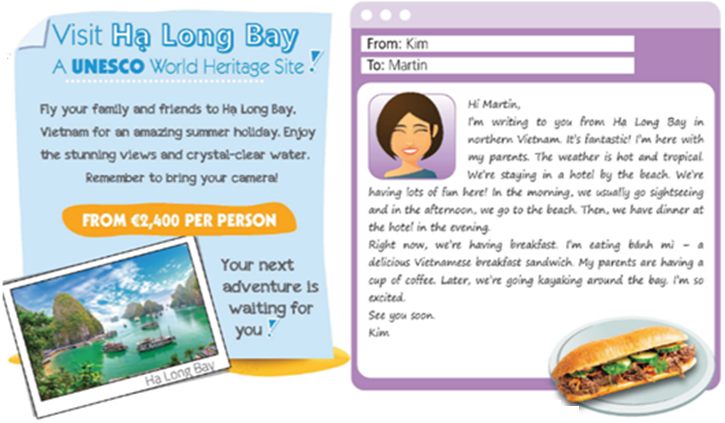
Text 1: Visit Hạ Long Bay A UNESCO World Heritage Site
Fly your family and friends to Hạ Long Bay, Vietnam for an amazing summer holiday. Enjoy the stunning views and crystal-clear water. Remember to bring your camera!
FROM €2,400 PER PERSON.
Your next adventure is waiting for you.
Text 2:
From: Kim
To: Martin
Hi Martin, I'm writing to you from Ha Long Bay in Northern Vietnam. It's fantastic! I'm here with my parents. The weather is hot and tropical. We're staying in a hotel by the beach. We're having lots of fun here! In the morning, we usually go sightseeing and in the afternoon, we go to the beach. Then, we have dinner at the hotel in the evening.
Right now, we're having breakfast. I'm eating bánh mì - a delicious Vietnamese breakfast sandwich. My parents are having a cup of coffee. Later, we're going kayaking around the bay. I'm so excited.
See you soon.
Kim
|
1. Hạ Long Bay is 2. Kim’s parents 3. Kim |
a. are having coffee. b. is staying in a hotel. c. in northern Vietnam. |
CÁC BÀI TẬP KHÁC


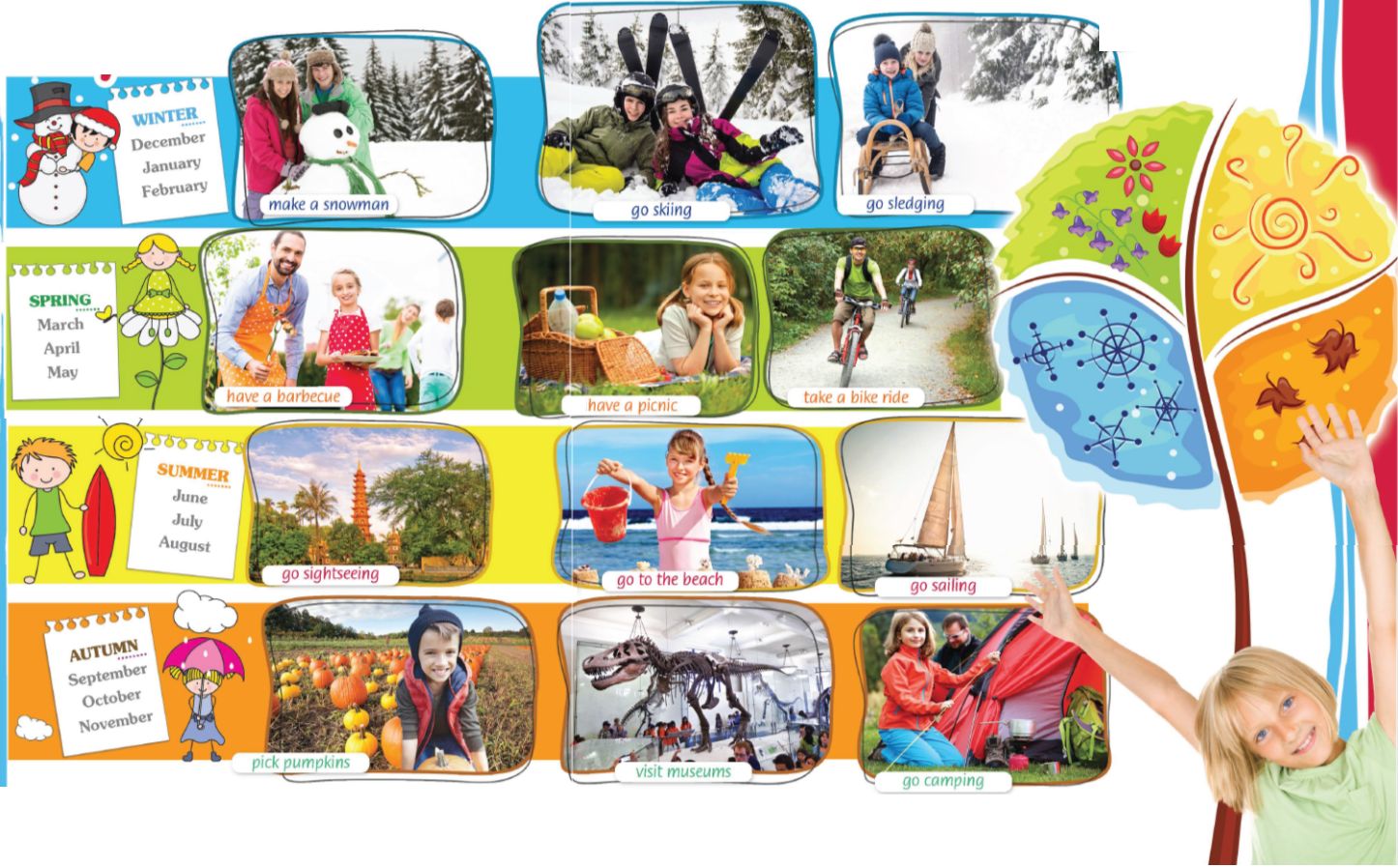
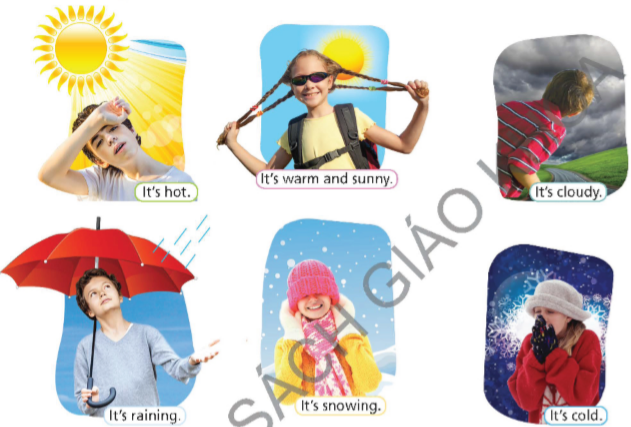


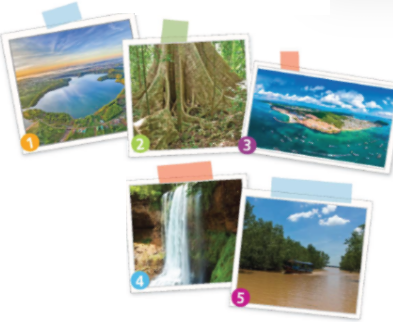
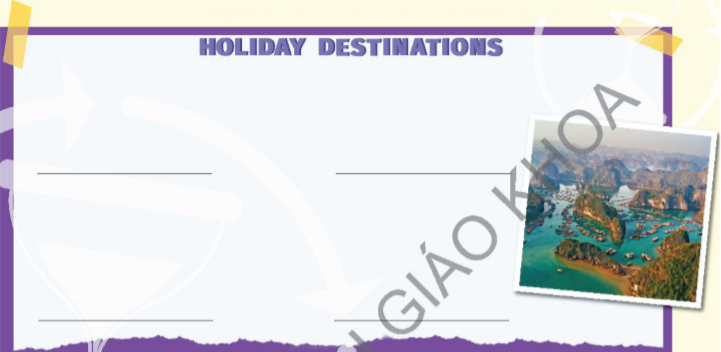

 \
\